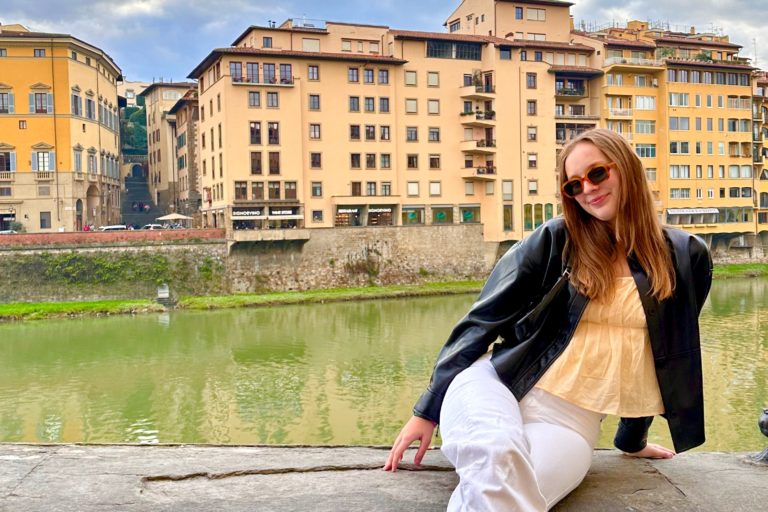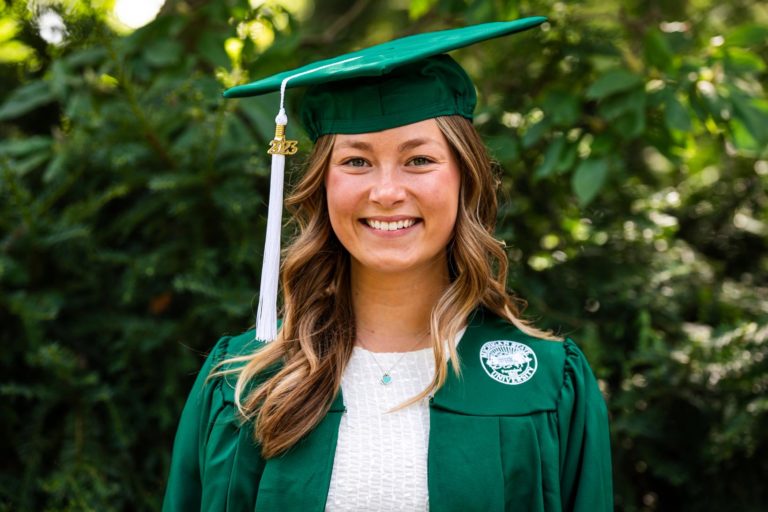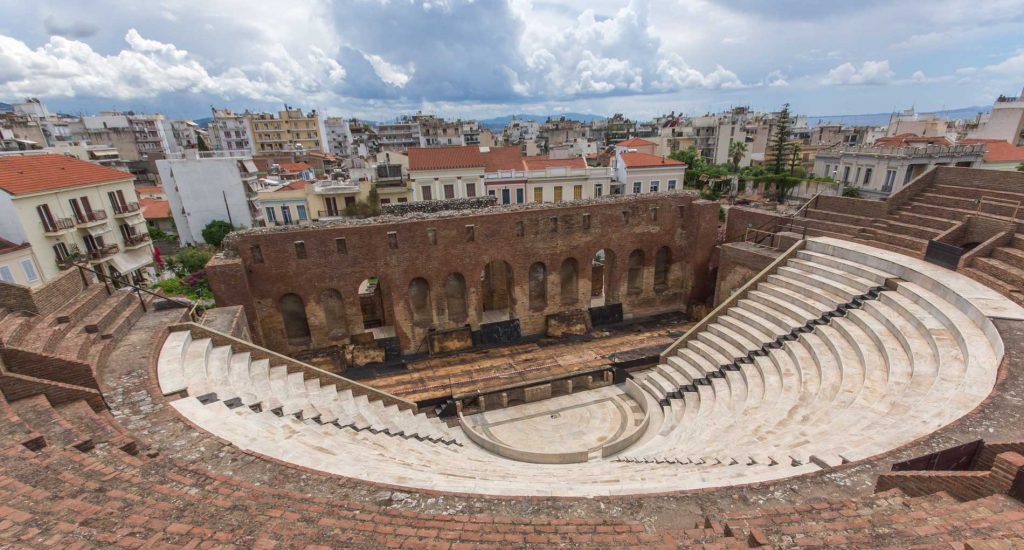
With the Ionian Sea and snow-capped mountains of southern Greece as a backdrop, a Department of Theatre professor used an entire university campus as his stage for a unique project he conceived involving a large cast of students.
Associate Professor Rob Roznowski, on a Fulbright Teaching Fellowship at the University of Patras in Greece, planned to take Arthur Miller’s American classic, A View from the Bridge, which has a small cast, and do the play in Greece. But when he arrived in Patras, he found much interest from students to be part of the production.
“I knew A View from the Bridge wouldn’t work with all those people,” Roznowski said, so he abandoned his original plan and took on another project where anyone who wanted could participate.
It was really an interesting and unique project that got the entire university involved and which was born out of my seeing the university with fresh eyes.
Working in tandem with the students, Roznowski devised a site-specific theatre piece, called “A Private Response to Public Art,” where about 40 student actors were stationed throughout the campus to perform movement pieces or short plays devoted to the public art and/or graffiti at each location.
Audience members were given maps to find the 25 different acts spread across the university, and during the 90-minute production, the students continuously performed.
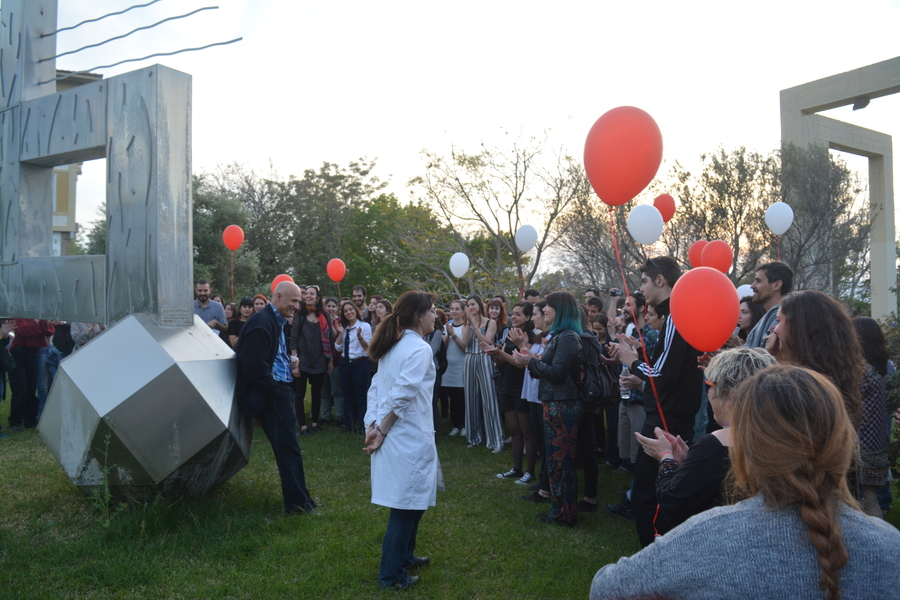
“It was really an interesting and unique project that got the entire university involved and which was born out of my seeing the university with fresh eyes,” Roznowski said. “Most of the things I identified for the public art nobody even paid attention to or had noticed. People commented afterward that they saw the university in new ways. I think it worked out better than my original idea.
“But what was really interesting about the project was the different aesthetic between the United States and Greece in the creation of performance and what constitutes theatre. It became this hybrid of Greek and American acting, Greek and America theatre, and that was the best part for the students because they came away, and so did I, with an expanded knowledge of both sides of the form.”
A colleague who helped Roznowski with the production is coming to MSU in the spring to teach Theatre students ancient Greek course techniques.
Language Barrier Challenges
One challenge Roznowski faced was the language barrier. He also taught two acting classes and had a translator who worked with him in the classroom.
For the most part, those language barriers were broken because we were talking about Greek drama; we were talking a universal language.
“I spoke pretty bad Greek and the students spoke good to OK English,” he said. “But for the most part, those language barriers were broken because we were talking about Greek drama; we were talking a universal language.
“Having to distill my work to the simplest expressions to be understood by another language has made my teaching much more focused and much more physical. There were so many times that I would explain concepts with my body and they would get it. It was really amazing.”
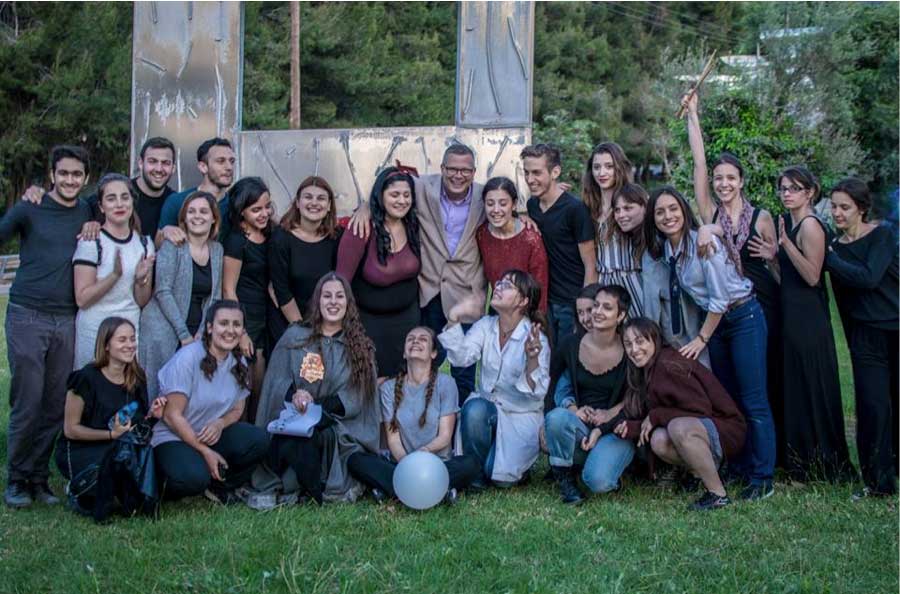
Roznowski served as a guest lecture in different classes and other faculty members also came to his class.
“It was a shared community of learning,” Roznowski said. “I learned so much just from watching their classes even when they were taught in Greek. I would take away concepts or major ideas.”
Other Projects Completed Abroad
During his time in Greece, Roznowski finished writing a book on psychology in acting to help actors overcome the self-imposed psychological road blocks they put on their work. He did all the research before he left, then lectured on the topic across Greece through the Fulbright Foundation, and completed the book while abroad. It is now under review.
He also finished a musical he wrote with Seth Burke, called Mount Olympus Junior High, which was featured this past summer at MSU’s Summer Circle Theatre. It’s about integration, intolerance, and bullying when Mount Olympus Junior High becomes integrated, mixing half mortals with full gods.
While in Greece, Roznowski did readings of the play and developed workshops.
“I thought that people were going to be mad at the bastardization of their myths, but they actually were really positive about it,” Roznowski said. “The children’s theatre professor was really thrilled about the way in which it became an educational tool. There also is an activity book for the kids.”
A Witness to the Refugee Crisis and Ancient Theatres
His first trip to Greece, Roznowski got there in January right at the very beginning of the refugee crisis. In the midst of what was a pretty bleak situation in Greece, he witnessed the kindness and compassion of the Greek people.
There’s a very different spirit of community and giving and I hope to bring that back as a human.
“You would see parks filling up with families. Then you would see the people in Greece coming and giving them clothing and food. It was that community aspect that was just so beautiful,” Roznowski said. “There’s a very different spirit of community and giving and I hope to bring that back as a human.”
Every weekend, Roznowski would rent a car and drive to ancient theatres in Greece.
“I was seeking out stuff that was way off the beaten path, and I would get there and cry my eyes out because first of how beautifully they are built into the landscape, but also how important theatre was, how it was the center of the community, and how it should retain that sort of power,” said Roznowski, who saw about 30 ancient theatres.
“During the austerity crisis, they talked a lot about the resurgence of theatre and how it’s become a much more powerful community-based gathering place than movies or anything like that because it’s people, living breathing people, in a room watching their stories being acted out, so in a way it’s kind of returning to the power that it had back in ancient times.”
